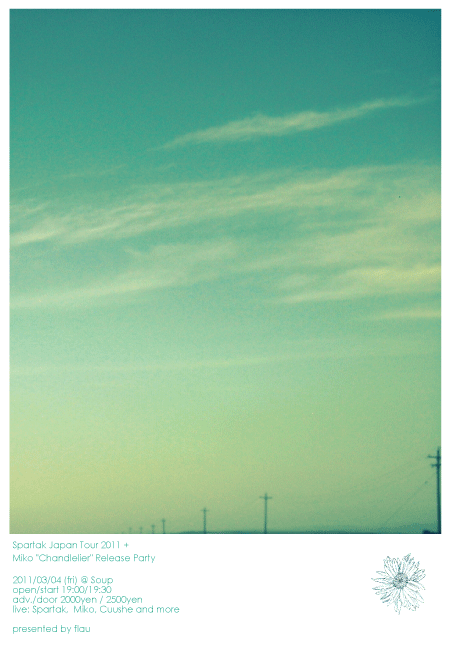
On March 4, 2011, I will have a small guest performance with Miko. It will only be several songs, but it will be the debut
of a new musical collaboration. I encourage anyone in the Tokyo area to please come to Miko’s release party!
Spartak Japan Tour 2011 + Miko “Chandlelier” Release Party
2011/03/04 (fri)
@Soup
open/start 19:00/19:30
adv./door 2000yen / 2500yen
live:
Spartak (hellosquare/low point)
Miko (someone good/plop)
Cuushe (flau)
and more
■ Spartak
地元キャンベラでHellosquarteを主宰し、12KのSeaworthyやStrategy(kranky/audio dregs)などオーストラリアを代表する先鋭的なアーティストをリリース、
自身もAdrian Klimpse(aka Triosk)やLibrary Tapesとのスプリットなどで名を馳せるShoeb Ahmad(guitar,computer,voice,woodwinds)と、
即興ジャズ・グループPollen Trioでの活躍でキャンベラ随一と名高い若手ドラマーEvan Dorrianによるデュオ。
これまでにJoe Lally (Fugazi), Leafcutter John, Andrew Pekler, Lucky Dragonsらと共演。
EmeraldsやTim Heckerらにも通ずるShoebのエモーショナルなギターサウンドと、
Trioskを彷彿とさせるEvanのドラムとのスリリングなせめぎ合いから生み出されるライブ・パフォーマンスには定評がある。
John Chantler(Room40)とのスプリットを経て昨年イギリスの新興レーベルLow Pointより『Verona』を発表。
ライヴから得られた経験と、This Heatなどポスト・パンク・バンドの実験精神からの影響をもとに、
わずか2日間でインプロヴィゼーションで作られたというこの作品は、英WIRE誌で絶賛、12KのMatt Rösnerが今年のベストアルバムに選出するなど、
音響/ジャズ/ポストロックの枠を超えた二人の凄まじいポテンシャルの高さを証明するアルバムとなった。
今回の初来日は『Verona』そしてLawrence English, Jasper TX, Adrian Klumpes(ex-Triosk)
らが参加したリミックス集『Version Room』の発売を記念して開催される。
http://hellosquare.wordpress.com/
http://www.myspace.com/spartakmusic
■ Miko
女性音楽家、光武理絵によるソロユニット。幼いころよりピアノやギターに触れ、バンド活動を経て、2000年頃から宅録のようなものを始める。2008年 6月に、国内のエレクトロニカレーベル、PLOPよりデビューアルバム「Parade」をリリース。2010年10月、オーストラリアRoom40傘下の アヴァンポップレーベルSomeone Goodより2ndアルバム「Chandelier」をリリース、米インディペンデント・ミュージックの有力メディアpitchforkで高い評価を得る など注目される。ソロ作の他にも、リミックスやヴォーカル参加、共作など海外アーティストとのコラボにも取り組んでいる。
http://mikohere.com/
http://www.myspace.com/mikohome
■ Cuushe
京都出身の女性アーティスト。関西でのバンド活動と並行し、2003年頃よりソロでの音楽製作を開始。Boards of CanadaやFishmans、L’Altraなどに影響を受けながら、より歌をメインとした楽曲にシフトしていく。2009年初の公式音源と なるデビュー・アルバム『Red Rocket Telepathy』を発表。日常と非日常を行き交うメランコリックなリリックを、抜群のメロディー・センスで編み上げた確かな歌世界を披露し、高い評価 を得た。最近では三重出身の気鋭の作曲家
金津朋幸や、イギリス人アーティストKonntinentの作品に参加するなど、その拙くも透明感溢れる歌声はアーティ スト、リスナーという枠を越え、幅広く支持されている。
http://www.myspace.com/cuushe